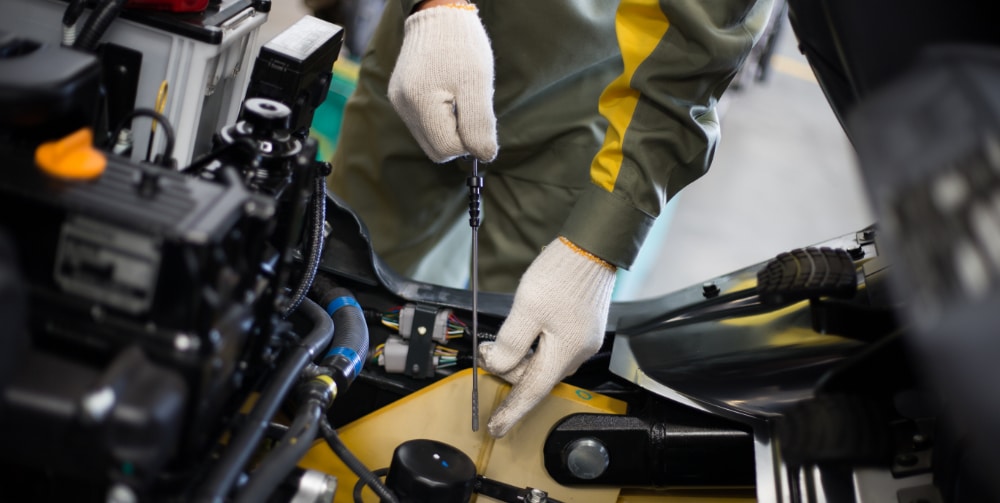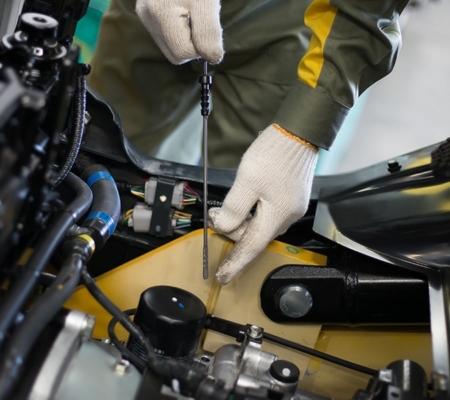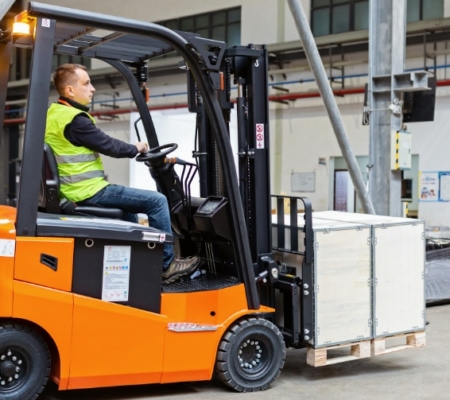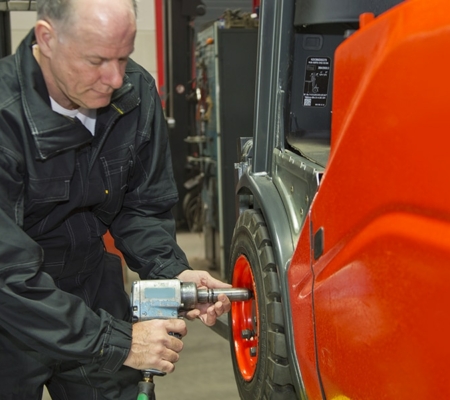DIY vs Professional Forklift Truck Servicing: Pros and Cons

When working with forklifts, servicing is part and parcel of keeping your forklift working efficiently and safely.
Servicing involves the inspection, testing, calibration and any necessary repairs of forklift components such as brakes, hydraulic systems and more. This is often undertaken by a certified professional who understands the complex workings of the forklift; however, it can be tempting to undertake some tasks yourself.
In this blog, we discuss the pros and cons of DIY and professional forklift truck servicing – and whether you can really undertake servicing yourself safely.
Understanding DIY Forklift Truck Servicing
DIY forklift servicing encompasses servicing which has not been performed by a trained technician – typically it is performed onsite by the owner or operator of the forklift.
DIY forklift truck servicing is not recommended – it can be dangerous and further violate the terms of LOLER (Lifting Operations and Lifting Equipment Regulations) as well as PUWER (Provision and Use of Work Equipment Regulations).
However, basic maintenance tasks, such as cleaning the forklift, topping off fluids, and inspecting it for faults, can be performed without the help of a professional to keep your forklift working efficiently.
Pros of DIY Forklift Truck Servicing
Undertaking some simple maintenance tasks at home on your forklift can have some benefits, such as keeping costs to a minimum and being more convenient for owners.
Cost Savings
One of the biggest temptations of DIY forklift servicing is cost savings. Some basic maintenance tasks which do not require a professional can be completed at a lower cost by doing them yourself.
Convenience and Flexibility
DIY forklift truck servicing can be undertaken at any time; being able to schedule servicing around your workload and the condition of your forklift is another benefit.
If your forklift changes in condition, environment, or is subject to an unexpected hazard, being able to perform some simple troubleshooting or maintenance tasks will offer peace of mind and increase the safety of handling work equipment on a daily basis.
Cons of DIY Forklift Truck Servicing
There are also limitations to DIY forklift servicing which should be seriously considered before beginning any work on your forklift.
Lack of Expertise and Specialised Knowledge
Of course, when servicing is not performed by a professional, there will be a knowledge and skills gap.
This can lead to difficulty in identifying complex issues – as well as fixing the issues, risking further damage to the forklift as well as compromising the safety of operators and employees.
Potential Safety Hazards
Performing complex servicing tasks, such as replacing parts or working with electrical systems, can be dangerous for an untrained person. The risk of accidents and injuries whilst undergoing servicing will increase if you’re not aware of what can go wrong.
DIY Servicing May Require More Time and Money Than Expected
Whilst you may think DIY servicing will be quicker and cheaper than going to a professional, it can oftentimes result in a more expensive and time-consuming operation than originally planned.
This can occur if you don’t have the necessary equipment; if you make a mistake; or if you don’t realise the extent of the forklift’s issues. You may still end up taking the forklift to a professional to rectify these mistakes.
Understanding Professional Forklift Truck Servicing
Professional forklift truck servicing refers to servicing which is completed by a trained and certified technician.
Atlas Forklift provides routine professional forklift servicing. Within this, we inspect over 30 major components of the forklift, ensuring it is safe for use and working efficiently, and will provide a service report.
It is recommended that your forklifts undergo professional servicing every 12 months as a minimum, or every 250-500 hours. However, this depends on the type of forklift.
Regular servicing is important in preventing accidents, reducing downtime and wear and tear on your forklift, as well as ensuring your forklift is as productive as possible.
Pros of Professional Forklift Truck Servicing
Professional forklift truck servicing is the most recommended way of servicing your forklift, and there are many reasons for this…
Expertise and Specialised Knowledge
Forklift technicians are trained and certified, with expertise and specialised knowledge in diagnosing and repairing any problems, offering a better quality service than a DIY.
Enhanced Safety Measures
Increase the safety of servicing by using a professional service. Professional forklift servicing will incorporate the necessary safety measures to ensure the service, forklift, and those handling the forklift remain safe.
Improves Productivity
Well serviced forklifts will work more efficiently, and therefore be more productive. Preventative maintenance ensures you get ahead of any potential issues with your forklift, reducing downtime.
Peace of Mind
Professional servicing offers the ultimate peace of mind knowing your forklift has been serviced by reputable and certified technicians. Your warranty may also be affected by any DIY servicing – so partnering with a professional ensures all work is to standard.
Longer Forklift Lifespan
Finally, you’ll benefit from a longer forklift lifespan by keeping your forklift up-to-date with servicing and maintenance, ensuring it is operating under its optimum conditions.
Cons of Professional Forklift Servicing
The higher costs and being limited to the availability of technicians are some downfalls to consider when booking your forklift in for a professional service.
Higher Costs
Costs are likely to be higher when working with a professional technician; this is due to paying for the technician’s time and skill, as well as the technician’s preferred branding of spare parts which may be needed.
Limited Flexibility in Scheduling
You will also have to book your service in advance or work around the technician’s schedule in an emergency. This could lead to a delay in servicing or short periods of downtime for your forklift. However, with preventative maintenance and routine scheduling, the likelihood of this is minimised.
Comparison of DIY and Professional Forklift Truck Servicing
Below we directly compare DIY and professional forklift truck servicing to see which is most suitable for your needs…
Effectiveness
Professional forklift services are likely to offer a more effective service, with technicians being familiar with the forklift components and understanding the processes required for a successful and thorough servicing. Professional servicing will also ensure any issues are resolved properly for effectiveness over time.
Safety
Professional servicing will always be the safest option. For the safety of all those handling the forklift, both during operation and servicing, servicing is best left to those who are properly trained and qualified to do so.
Time Efficiency
Whilst DIY servicing is the more convenient option – working on your own time schedule, as and when you need to – professional servicing can be considered the most time efficient. With a technician undertaking the servicing, you can spend this time as you please, and don’t have to worry about downtime which may follow an inefficient DIY service.
Cost Implications
When it comes to cost, DIY servicing is the cheaper option. However, cheap solutions do not always equal cost-effectiveness – and a cheap forklift servicing could lead to expensive problems further down the line.
When it comes to DIY servicing vs professional forklift truck servicing, professional forklift servicing is always recommended. Whilst there are some simple maintenance tasks which can be undertaken at home, your full routine servicing should be professionally completed in order to adhere to the conditions of LOLER and PUWER.


